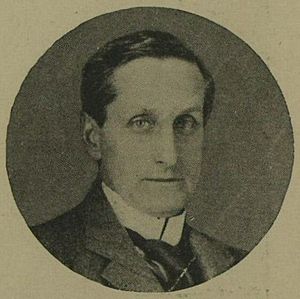Frederick Chance facts for kids
Sir Frederick William Chance (born December 26, 1852 – died August 31, 1932) was a British politician from Carlisle. He was a member of the Liberal Party. He served in the House of Commons, which is a main part of the British Parliament, from 1905 to 1910.
Contents
Who Was Sir Frederick Chance?
Sir Frederick William Chance came from an important family in Carlisle. His family was well-known for business and politics. He managed his family's cotton-making company, called Ferguson Brothers. This company was a big part of the town's industry.
His Early Public Service
Before becoming a national politician, Sir Frederick served his local community. He was the Mayor of Carlisle in 1904. This means he was the leader of the city's government for a year. After that, he joined the Cumberland County Council. This council helped manage the wider area around Carlisle.
A Family of Politicians
Politics was a family tradition for Sir Frederick. His grandfather, Joseph Ferguson, was a Member of Parliament (MP) for Carlisle. An MP is someone elected to represent their area in the House of Commons. His uncle, Robert Ferguson, was also an MP for Carlisle. Sir Frederick's brother-in-law, Sir Henry Seton-Karr, was an MP for another area called St Helens.
Becoming an MP for Carlisle
The MP for Carlisle before Sir Frederick was William Court Gully. Mr. Gully was a very important person. He was the Speaker of the House of Commons from 1895 to 1905. The Speaker is like the referee of the House of Commons, making sure debates run smoothly.
In May 1905, Mr. Gully had to leave his job as Speaker because he was unwell. This meant there was a special election, called a by-election, in Carlisle. In July 1905, Sir Frederick Chance was chosen by the people of Carlisle to be their new MP.
His Time in Parliament
Sir Frederick was re-elected without anyone running against him in the 1906 general election. A general election is when people across the whole country vote for their MPs. He continued to be the MP for Carlisle until the January 1910 general election. At that election, he decided not to run again.
In 1915, he was given the important role of High Sheriff of Cumberland. This is a ceremonial position that represents the King or Queen in the county.


